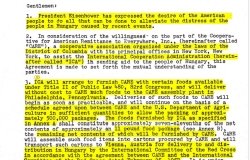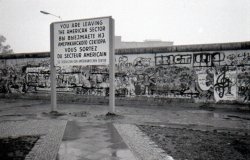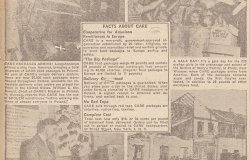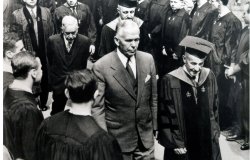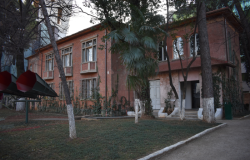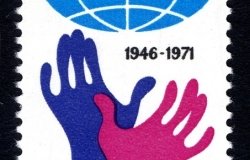Khrushchev: The Man and His Era by William Taubman
The Cold War International History Project and the Kennan Institute present author William Taubman, Strobe Talbott, president of The Brookings Institution, and jounalist Daniel Schorr to discuss Khrushchev: The Man and His Era.
Overview
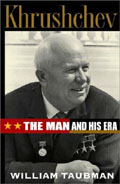 After extensive research, writing, and editing, William Taubman, Bernard Snell Professor of Political Science at Amherst College, celebrated the launch of his latest book, Khrushchev: The Man and His Era, at the Wilson Center in front of over one hundred historians, students, and former policy makers. The event was co-sponsored by the Cold War International History Project and the Kennan Institute for Advanced Russian Studies. Commenting on the findings were Strobe Talbott, President of The Brookings Institution, and Daniel Schorr, Senior News Analyst for NPR.
After extensive research, writing, and editing, William Taubman, Bernard Snell Professor of Political Science at Amherst College, celebrated the launch of his latest book, Khrushchev: The Man and His Era, at the Wilson Center in front of over one hundred historians, students, and former policy makers. The event was co-sponsored by the Cold War International History Project and the Kennan Institute for Advanced Russian Studies. Commenting on the findings were Strobe Talbott, President of The Brookings Institution, and Daniel Schorr, Senior News Analyst for NPR.
After a short introduction by the Cold War International History Project Director Christian Ostermann, Wiliam Taubman started his presentation saying that his book had three main foci. The first pertained to Khrushchev as a leader in the 1950s and his reform policies. Taubman compared Khrushchev's reforms to those of Mikhail Gorbachev in the 1980s. He cited the "Secret Speech" Khrushchev delivered shortly after Stalin's death in 1953 as a prime example. The book's second focus, following the idea of Khrushchev the reformer, related to the ways in which he set the stage for those who followed him. Taubman mentioned that Gorbachev and others were finishing the reforms that Khrushchev began, and if Khrushchev had not been CPSU First Secretary reforms may have come slower. The final focus, related to Khrushchev's early years, primarily the 1930's. These years, Taubman believes, were the most important for Khrushchev. Khrushchev slowly climbed the ladder of power in the 1930s and along the way was shaped by the events he witnessed and took part in.
William Taubman went on to explain that he had recently been asked to provide a publisher in England with ten revelations on Khrushchev that he had discovered. After considering for a period (and being asked three times in true Russian fashion) he came up with ten revelations. He chose to share three at the panel. First, Professor Taubman explained that Khrushchev had actually been a Trotskyite for a brief period of time in the 1920s. Secondly, while it has been generally accepted that Khrushchev was married twice, Taubman discovered that he actually had three wives. Lastly, when the attempted 1957 coup occurred, Khrushchev for a short period of time believed he had lost and become so despondent that aides found him weeping in a Kremlin hallway.
Describing Khrushchev's personality, Taubman painted a picture of a somewhat primitive man, with little education, but very ambitious and yearning to accomplish greater things. Taubman added that Khrushchev could be shrewd, cunning, and despite his lack of education, very intelligent. He also added that Khrushchev had purposely played up his image as a simpleton, at times almost a court jester. However, he added that this always seemed to pain Khrushchev, because he so admired refinement and intelligence.
Daniel Schorr, who served as a correspondent in Moscow for many years during the Khrushchev period, begun by saying that he had greatly enjoyed the book. He explained that despite being in Moscow, just meters from the Kremlin, the journalists (including himself) never really knew what was going on. With Taubman's new book, Shorr stated, a whole window had been opened on issues that still puzzled him.
Strobe Talbott, began by stating that the book was extremely informative and a true pleasure to read. Ambassador Talbott, a Khrushchev specialist and the editor of Khrushchev Remembers, explained that Taubman's book added new insight in the extremely complex nature of Khrushchev's personality. Talbott, while agreeing that the book had answered many questions about Khrushchev, thought that some questions were still outstanding. How did Khrushchev survive Stalin's purges and how did guilt and humanity survive within Khrushchev despite all that he witnessed and participated in were, in Talbott's opinion the most important.
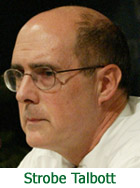 Professor Taubman answered that by playing up his simplicity, Khrushchev was able to survive Stalin's purges. Even if doing so bothered him, he was able to convince Stalin that he was not a danger. Taubman added that Stalin naturally distrusted people who appeared to be hiding something.
Professor Taubman answered that by playing up his simplicity, Khrushchev was able to survive Stalin's purges. Even if doing so bothered him, he was able to convince Stalin that he was not a danger. Taubman added that Stalin naturally distrusted people who appeared to be hiding something.
As far as Khrushchev's humanity was concerned, Taubman suggested that throughout it all Khrushchev always nursed a sense of anger and repulsion at what Stalin was doing to the Soviet Union. Though, Taubman said that the speech at the 20th Party Congress supported this assumption, during his research he tried to find an example from the 1930s when Khrushchev might have expressed some revulsion at Stalin. He was able to find a few examples from childhood friends, that Khrushchev at varying times expressed displeasure with Stalin's policy and with Stalin the man. Taubman agreed that all the evidence he had found was circumstantial, but said he was fairly convinced by it. He did add, and Mr. Schorr and Ambassador Talbott agreed with him, that Khrushchev always was disappointed with the deaths of people who he viewed as good communists even if Khrushchev never felt too bad about the millions of other people that were killed in Stalin's purges.
Drafted by Craig Burnett and Conor Savoy
Panelists' Biographies:
William Taubman is the Bertrand Snell Professor of Political Science at Amherst College. He is the author of Khrushchev: The Man and His Era, published by W. W. Norton in March 2003. His publications include The View from Lenin Hills: Soviet Youth in Ferment (1967), Governing Soviet Cities: Bureaucratic Politics and Urban Development in the USSR (1973), and Stalin's American Policy: From Entente to Detente to Cold War (1982); Moscow Spring (with Jane Taubman, 1989); Khrushchev on Khrushchev by Sergei N. Khrushchev (editor-translator, 1990); and Nikita Khrushchev (co-edited with Sergei Khrushchev and Abbott Gleason, 2000). He has also written op-ed articles and book reviews for The New York Times and other journals.
Taubman is an Associate of the Davis Center for Russian and Eurasian Studies at Harvard University, where he also serves on the Steering Committee of the Harvard Cold War Studies Project. He currently chairs the Advisory Committee of the Cold War International History Project of the Woodrow Wilson Center and was a member the International Advisory Group for the Russian Foreign Ministry Archives. Taubman served on the Policy Planning Staff of the U. S. Department of State as an International Affairs Fellow of the Council on Foreign Relations from 1970-1971. He has held Rockefeller and Fulbright-Hays Fellowships as well as an NEH Fellowship in the Humanities. He also served as a Senior Fellow of the Harriman Institute at Columbia University and as a Fellow of the Woodrow Wilson Center.
Veteran reporter-commentator Daniel Schorr, the last of Edward R. Murrow's legendary CBS team still fully active in journalism, currently interprets national and international events as senior news analyst for NPR. A foreign correspondent for more than 20 years, Schorr has covered the most important world events and leaders for The Christian Science Monitor, The New York Times, CBS News, for CNN and most recently for NPR as News Analyst for All Things Considered, Weekend Edition Saturday, and Weekend Edition Sunday, and participating in live coverage of important events.
Schorr has been awarded the most prestigious awards in journalism including the Alfred I. DuPont-Columbia University Golden Baton for "Exceptional Contributions to Radio and Television Reporting and Commentary," three Emmy's, the George Foster Peabody personal award for "a lifetime of uncompromising reporting of the highest integrity," the George Polk radio commentary award forr "interpretations of national and international events," and the Distinguished Service Award of the American Society of Schools of Journalism and Mass Communications. Schorr has also been inducted into the Hall of Fame of the Society of Professional Journalists. In 2002, Schorr was elected to the prestigious American Academy of Arts and Sciences.
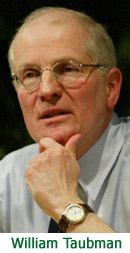 Strobe Talbott assumed the presidency of the Brookings Institution in July 2002 after a career in journalism, government and academe. His immediate previous post was founding director of the Yale Center for the Study of Globalization. He served in the State Department from 1993 to 2001, first as Ambassador-at-large and special adviser to the Secretary of State for the new independent states of the former Soviet Union, then as Deputy Secretary of State for seven years.
Strobe Talbott assumed the presidency of the Brookings Institution in July 2002 after a career in journalism, government and academe. His immediate previous post was founding director of the Yale Center for the Study of Globalization. He served in the State Department from 1993 to 2001, first as Ambassador-at-large and special adviser to the Secretary of State for the new independent states of the former Soviet Union, then as Deputy Secretary of State for seven years.
Mr. Talbott entered government after twenty-one years with Time magazine. He has also written for Foreign Affairs, The New Yorker, Foreign Policy, International Security, The Economist, The Financial Times, The New York Times, The Washington Post and Slate. His books include: At the Highest Levels (with Michael Beschloss), The Master of the Game, Reagan and Gorbachev (with Michael Mandelbaum), Deadly Gambits, Reagan and the Russians, Endgame, Khrushchev Remembers: The Last Testament, Khrushchev Remembers.
Hosted By

Cold War International History Project
The Cold War International History Project supports the full and prompt release of historical materials by governments on all sides of the Cold War. Through an award winning Digital Archive, the Project allows scholars, journalists, students, and the interested public to reassess the Cold War and its many contemporary legacies. It is part of the Wilson Center's History and Public Policy Program. Read more
Thank you for your interest in this event. Please send any feedback or questions to our Events staff.
